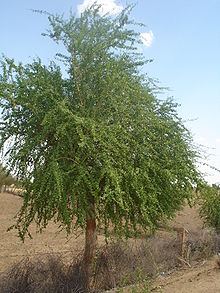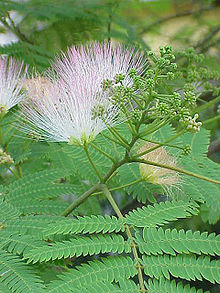 |
| Balanites roxburghii |
Common names . Hingu , Ingiluka ,Hinganbet.
A spiny shrub or a small tree growing throughout the driest parts of the State on open situations.
Young leaves and twigs are eaten by cattle
Balanites roxburghii, commonly known as desert date, is a tree species native to various arid and semi-arid regions of Africa and the Indian subcontinent. It is a versatile and hardy plant that has several practical uses and is of ecological and economic importance. Here are some key characteristics and information about Balanites roxburghii:
Plant Description: Balanites roxburghii is a medium-sized, evergreen tree that can reach heights of up to 10 meters (about 33 feet). It has a characteristic umbrella-shaped crown and compound leaves with leaflets.
Fruits: The most notable feature of Balanites roxburghii is its fruit, which is commonly known as desert date. The fruit is a small, ovoid drupe that turns from green to yellow when ripe. The fruit contains a single large seed and has a sweet, edible pulp. It is an important food source in arid regions.
Habitat: Desert date is well adapted to arid and semi-arid environments and can be found in a variety of habitats, including deserts, scrublands, and savannas. It is known for its ability to thrive in harsh, dry conditions.
Culinary Uses: The edible fruit of Balanites roxburghii is consumed by both humans and livestock. It is often eaten fresh or dried and can be used to make traditional dishes, jams, and beverages. The oil extracted from the seeds is also used in cooking and as a source of lighting.
Traditional Medicine: Various parts of the tree, including the bark, leaves, and fruit, have been used in traditional medicine by indigenous communities. They are believed to have medicinal properties and have been used to treat a range of ailments.
Wood: The wood of Balanites roxburghii is durable and resistant to termites, making it valuable for construction and woodworking. It is used for making furniture, agricultural implements, and tools.
Conservation: While not necessarily considered endangered, the conservation status of Balanites roxburghii may vary by region due to habitat degradation and overexploitation.
Other Names: Balanites roxburghii is known by various regional names, including "desert date," "soapberry tree," and "Hingot."






